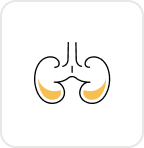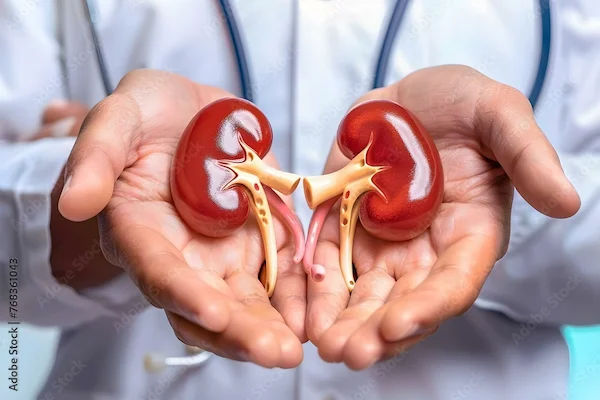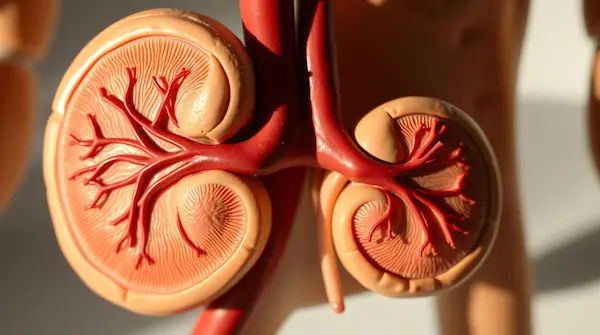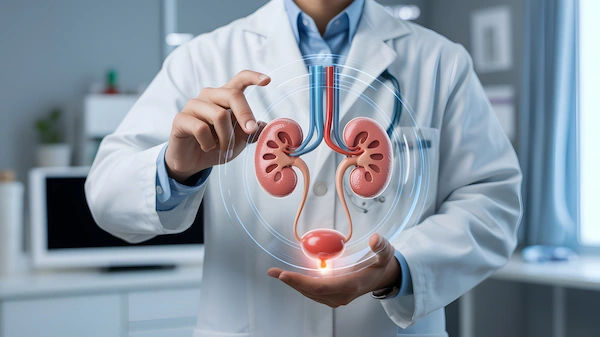10 Silent Signs of Chronic Kidney Disease: Recognising the Stages
Discover the silent signs of chronic kidney disease, from early fatigue and foamy urine to advanced stage symptoms. Learn about CKD stages, risk factors, and when to seek medical advice.

Written by Dr. M L Ezhilarasan
Reviewed by Dr. Dhankecha Mayank Dineshbhai MBBS
Last updated on 13th Jan, 2026

Introduction
Chronic Kidney Disease (CKD) is often called a "silent killer" because its signs and symptoms are easily overlooked until the condition is significantly advanced. Your kidneys are remarkably resilient and can compensate for lost function until damage becomes severe. Understanding the subtle warnings and the progressive stages of CKD is the first and most crucial step towards protecting your health. This guide will walk you through the five stages of chronic kidney disease, highlighting the key signs at each phase, and empower you with the knowledge to take action. Recognising these signals early can dramatically slow the disease's progression and preserve your quality of life.
What is Chronic Kidney Disease (CKD)?
Chronic Kidney Disease is a progressive condition characterised by the gradual loss of kidney function over months or years. Unlike acute kidney injury, which happens suddenly, CKD is a long-term deterioration. The kidneys' primary role is to filter waste products and excess fluids from the blood, which are then excreted in urine. When they are damaged, they cannot perform this essential task effectively, leading to a dangerous buildup of toxins in the body.
The Kidneys' Vital Role in Your Body
Your kidneys are not just simple filters. They are sophisticated organs that:
- Remove waste and extra fluid
- Control blood pressure by releasing hormones
- Produce red blood cells by releasing erythropoietin
- Keep bones healthy by activating Vitamin D
- Maintain a critical balance of salts and minerals in your blood
How CKD Develops Over Time
CKD typically develops due to conditions that put ongoing strain on the kidneys. The two most common causes are diabetes and high blood pressure. Over time, high blood sugar can damage the kidneys' blood vessels, while high blood pressure can narrow and harden them, impairing their filtering ability.
Consult Top Doctors for Personalised Advice
The 5 Stages of Chronic Kidney Disease: A Breakdown
Doctors classify CKD into five stages based on your Glomerular Filtration Rate (GFR), which measures how well your kidneys are filtering blood. This staging guides treatment and helps predict outcomes.
Stage 1 CKD: Kidney Damage with Normal Function
GFR: 90 or higher (normal function)
There is evidence of kidney damage, such as protein in the urine or physical damage seen on scans, but kidney function remains normal.
- Signs and Symptoms to Watch For: Often none. The only sign may be proteinuria (protein in the urine), which can cause foamy urine. High blood pressure that is difficult to control can also be a clue.
- Management and Action Steps: Treat underlying causes, manage diabetes or hypertension, adopt lifestyle changes including a low-salt diet, regular exercise, and quitting smoking.
Stage 2 CKD: Mild Loss of Function
GFR: 60 to 89
Mild loss of kidney function occurs alongside evidence of kidney damage.
- Signs and Symptoms to Watch For: Symptoms are still rare. Mild fatigue or minor urination changes may appear but are often attributed to other causes.
- Management and Action Steps: Continue managing underlying conditions and monitor GFR and urine albumin regularly.
Stage 3 CKD: Moderate Loss of Function
GFR: 30 to 59
Kidney function is moderately reduced.
- Stage 3a vs. Stage 3b
- Stage 3a: GFR 45–59, mild to moderate decline
- Stage 3b: GFR 30–44, moderate to severe decline, with higher risk of complications
Common Symptoms That Become Noticeable: Fatigue and weakness due to anaemia, swelling in hands, feet or around the eyes, changes in urination, and lower back pain.
Stage 4 CKD: Severe Loss of Function
GFR: 15 to 29
Kidney function is severely reduced.
- Signs and Symptoms to Watch For: Symptoms from earlier stages intensify. New symptoms may include nausea, vomiting, metallic taste or ammonia breath, loss of appetite, and muscle cramps.
- Management: Begin discussions about dialysis or kidney transplant. Diet restrictions often include limiting potassium, phosphorus, and protein.
Stage 5 CKD: Kidney Failure (End-Stage Renal Disease)
GFR: Less than 15
Kidneys have lost nearly all ability to function.
- Symptoms and Treatment Options: Severe symptoms may include itching, muscle cramps, breathing
- difficulties, and confusion. Survival requires renal replacement therapy, either dialysis or a kidney transplant.
Beyond the Stages: Other Crucial Warning Signs
Symptoms can vary from person to person, beyond the defined stages. Watch for:
- Physical Symptoms: Puffiness around the eyes, shortness of breath, extremely dry or itchy skin
- Urination Changes: Foamy urine or blood in the urine
- Metabolic Symptoms: Metallic taste and persistent nausea
Who is at Risk for CKD?
You may be at higher risk if you have:
- Diabetes
- High blood pressure
- Heart disease
- Family history of kidney failure
- Recurrent kidney infections or stones
- Long-term use of certain medications such as NSAIDs
How is CKD Diagnosed? Key Tests to Know
If you experience symptoms or have risk factors, it is important to get tested. Diagnosis typically involves:
- Blood Test: Measures creatinine to calculate eGFR
- Urine Test: Checks for albumin (protein) through the Albumin-to-Creatinine Ratio
Get Your Health Assessment Done
Living Well with CKD: Management and Next Steps
CKD is serious but manageable. Effective strategies include:
- Strict control of blood sugar and blood pressure
- Kidney-friendly diet low in sodium, potassium, and phosphorus
- Regular exercise and healthy weight maintenance
- Avoiding medications that can harm the kidneys
- Regular check-ups
Consult a doctor online with Apollo24|7 for personalised evaluation and tests if symptoms persist or you have risk factors.
Conclusion
Recognising the stages of chronic kidney disease and their signs empowers you to take control of your health. While early symptoms may be subtle, awareness of fatigue, swelling, and changes in urination can prompt timely action. CKD is not a final verdict; careful management of lifestyle and underlying conditions can slow progression and preserve kidney function. If you notice any warning signs or risk factors, consult a healthcare professional promptly to protect your health.
Consult Top Nephrologists
Consult Top Nephrologists
Dr Gayatri Pegu
Nephrologist
15 Years • MD (General Medicine) DM(Nephrology)
Guwahati
Apollo Clinic Guwahati, Assam, Guwahati
Dr Ch Sashidhar
Nephrologist
20 Years • MBBS, MD General Medicine, DNB, Nephrology
Secunderabad
Apollo Hospitals Secunderabad, Secunderabad

Dr Praveen Kumar Etta
Nephrologist
10 Years • MBBS,MD DM(SGPGI) FORMER ASST(PIMS)
Hyderabad
Apollo Spectra Ameerpet, Hyderabad

Dr. Pardha Saradhi
Nephrologist
9 Years • MBBS, MD-DNB (Gen. Med.), DNB (Nephro)
Hyderabad
Apollo Hospitals D R D O kanchanbagh, Hyderabad
(75+ Patients)

Dr. Manju Kamal
Nephrologist
12 Years • MBBS,MD(General Medicine), DNB,DM(Nephrology)
Angamaly
Apollo Hospitals Karukutty, Angamaly
Consult Top Doctors for Personalised Advice
Dr Gayatri Pegu
Nephrologist
15 Years • MD (General Medicine) DM(Nephrology)
Guwahati
Apollo Clinic Guwahati, Assam, Guwahati
Dr Ch Sashidhar
Nephrologist
20 Years • MBBS, MD General Medicine, DNB, Nephrology
Secunderabad
Apollo Hospitals Secunderabad, Secunderabad

Dr Praveen Kumar Etta
Nephrologist
10 Years • MBBS,MD DM(SGPGI) FORMER ASST(PIMS)
Hyderabad
Apollo Spectra Ameerpet, Hyderabad

Dr. Pardha Saradhi
Nephrologist
9 Years • MBBS, MD-DNB (Gen. Med.), DNB (Nephro)
Hyderabad
Apollo Hospitals D R D O kanchanbagh, Hyderabad
(75+ Patients)

Dr. Manju Kamal
Nephrologist
12 Years • MBBS,MD(General Medicine), DNB,DM(Nephrology)
Angamaly
Apollo Hospitals Karukutty, Angamaly
More articles from Kidney Disease
Frequently Asked Questions
What are the first warning signs of kidney disease?
The earliest signs are often invisible without tests, such as proteinuria. Physical signs may include fatigue, difficulty concentrating, poor appetite, foamy urine, and puffiness around the eyes.
Can damaged kidneys heal?
Kidney damage from CKD is usually permanent. Treatment focuses on slowing progression and preserving existing function. Early intervention is key.
What is the life expectancy for someone with stage 3 kidney disease?
Life expectancy varies with age, overall health, and disease management. Many live for decades with stage 3 CKD by controlling blood pressure, blood sugar, and following a prescribed diet.
What foods should you avoid with kidney disease?
Depending on stage and blood tests, a kidney-friendly diet may limit sodium, potassium, phosphorus, and sometimes protein. A dietitian can create a personalised plan.
How often should you get tested for kidney disease?
With major risk factors, eGFR and urine albumin should be tested at least once a year. Diagnosed CKD patients may need testing every 3–6 months depending on stage.





